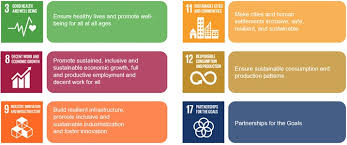The Importance of Sustainable Goals
In today’s world, the concept of sustainability has gained significant importance as we face pressing environmental challenges. Sustainable goals play a crucial role in guiding individuals, organisations, and governments towards a more environmentally friendly and socially responsible future.
What are Sustainable Goals?
Sustainable goals are targets set to promote sustainable development by addressing key issues such as climate change, poverty, inequality, and biodiversity loss. These goals serve as a roadmap for creating a more sustainable world for current and future generations.
Why are Sustainable Goals Important?
Environmental Protection: Sustainable goals help protect our planet’s natural resources and ecosystems by promoting responsible consumption and production practices.
Social Equity: By focusing on sustainable development, we can reduce inequalities, promote social inclusion, and ensure that everyone has access to basic necessities such as clean water, food, and healthcare.
Economic Growth: Embracing sustainable goals can drive innovation, create new job opportunities in green sectors, and foster economic growth while minimising negative impacts on the environment.
Examples of Sustainable Goals
- Climate Action: Committing to reducing greenhouse gas emissions to mitigate the effects of climate change.
- Zero Hunger: Ensuring food security for all by promoting sustainable agriculture practices.
- Clean Energy: Transitioning to renewable energy sources to reduce reliance on fossil fuels.
- Sustainable Cities: Creating urban environments that are inclusive, safe, resilient, and sustainable.
- Life Below Water: Protecting marine ecosystems and promoting sustainable fishing practices.
- Quality Education: Providing inclusive and equitable education opportunities for all individuals.
In conclusion, embracing sustainable goals is essential for safeguarding our planet’s future and ensuring a better quality of life for all. By working together towards these common objectives, we can create a more sustainable world that benefits both people and the environment.
Six Essential Tips for Achieving Sustainable Goals
- Reduce, reuse, and recycle to minimise waste
- Choose products with minimal packaging to reduce plastic consumption
- Conserve energy by turning off lights and electronics when not in use
- Support local and sustainable businesses for a smaller carbon footprint
- Use public transportation, walk, or bike instead of driving alone to reduce emissions
- Educate yourself and others about the importance of sustainability for a better future
Reduce, reuse, and recycle to minimise waste
To achieve sustainable goals, it is crucial to adopt the principle of “reduce, reuse, and recycle” to minimise waste. By reducing our consumption, reusing items whenever possible, and recycling materials, we can significantly decrease the amount of waste that ends up in landfills or pollutes our environment. This simple yet effective approach not only conserves valuable resources but also helps to reduce our carbon footprint and promote a more sustainable way of living for future generations.
Choose products with minimal packaging to reduce plastic consumption
Choosing products with minimal packaging is a simple yet effective way to contribute to sustainable goals, particularly in reducing plastic consumption. By opting for items that have minimal or recyclable packaging, we can help minimise the amount of plastic waste that ends up in landfills or pollutes our oceans. This small change in consumer behaviour can have a significant positive impact on the environment by promoting eco-friendly practices and encouraging manufacturers to adopt more sustainable packaging solutions.
Conserve energy by turning off lights and electronics when not in use
Conserving energy by turning off lights and electronics when not in use is a simple yet effective way to contribute to sustainable goals. By being mindful of our energy consumption habits, we can reduce unnecessary electricity usage and lower our carbon footprint. This small action not only helps in conserving resources but also contributes to mitigating climate change and promoting a more sustainable future for generations to come.
Support local and sustainable businesses for a smaller carbon footprint
Supporting local and sustainable businesses is a crucial step towards achieving sustainable goals and reducing our carbon footprint. By choosing to buy from local businesses that prioritise sustainability, we can minimise the environmental impact of transportation and support the local economy. These businesses often employ eco-friendly practices, such as using renewable energy sources and reducing waste, which contribute to a healthier planet. Making conscious decisions to support such initiatives not only benefits the environment but also promotes a more sustainable and resilient community for future generations.
Use public transportation, walk, or bike instead of driving alone to reduce emissions
To contribute towards sustainable goals, individuals can make a positive impact by opting to use public transportation, walking, or cycling instead of driving alone. By choosing these alternative modes of transport, we can significantly reduce emissions that contribute to air pollution and climate change. Embracing sustainable transportation options not only helps in lowering our carbon footprint but also promotes healthier lifestyles and supports the development of eco-friendly urban environments. Making small changes in our daily commuting habits can lead to significant benefits for both the environment and our communities.
Educate yourself and others about the importance of sustainability for a better future
Educating oneself and others about the significance of sustainability is a crucial step towards building a better future for our planet. By raising awareness about the importance of sustainable practices, we can inspire positive change and encourage individuals, communities, and organisations to make informed decisions that benefit both the environment and society. Through education and advocacy, we can create a more sustainable world where future generations can thrive in harmony with nature.

